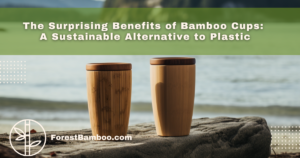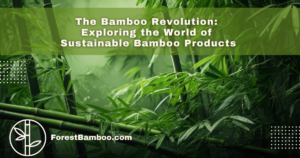When you think about your daily routine, the toothbrush might not be the first item that comes to mind in terms of environmental impact. However, traditional plastic toothbrushes contribute significantly to the global plastic waste crisis. Each year, billions of plastic toothbrushes are discarded, and since they are made from non-biodegradable materials, they can take hundreds of years to decompose.
This means that every toothbrush you’ve ever used is likely still sitting in a landfill somewhere, contributing to the growing mountains of plastic waste that threaten our ecosystems. Moreover, the production process for these plastic toothbrushes is not without its environmental toll. The extraction of petroleum, which is used to create the plastic, involves harmful drilling practices that can lead to oil spills and habitat destruction.
Additionally, the manufacturing process itself emits greenhouse gases, further exacerbating climate change.
View Bamboo Products at our online store for sustainable and eco-friendly options.
Key Takeaways
- Traditional toothbrushes contribute to plastic pollution and environmental damage
- Bamboo toothbrushes are biodegradable and eco-friendly
- Consider the bristle type, handle size, and packaging when choosing a bamboo toothbrush
- Rinse and air dry your bamboo toothbrush to prolong its lifespan
- Bamboo toothbrushes can be composted or recycled responsibly for minimal environmental impact
The Benefits of Bamboo Toothbrushes
Biodegradability
One of the most significant benefits of bamboo toothbrushes is their biodegradability. Made from natural bamboo, these toothbrushes can decompose within a few months when disposed of properly, unlike plastic which lingers in landfills for centuries.
Eco-Friendly and Effective
By choosing a bamboo toothbrush, you are making a conscious decision to reduce your plastic footprint and contribute to a healthier planet. In addition to being eco-friendly, bamboo toothbrushes often come with soft bristles made from nylon or other biodegradable materials. This means you can maintain your oral hygiene without compromising on effectiveness.
A Healthier Choice
Many users find that bamboo toothbrushes are just as effective at cleaning teeth and gums as traditional brushes. Furthermore, bamboo has natural antibacterial properties, which can help keep your toothbrush cleaner for longer periods. By opting for a bamboo toothbrush, you’re not only making a sustainable choice but also promoting better health for yourself and the environment.
How to Choose the Right Bamboo Toothbrush

Selecting the right bamboo toothbrush can feel overwhelming given the variety of options available on the market today. Start by considering the bristle type; soft bristles are generally recommended for most people as they are gentle on gums while still effectively cleaning teeth. If you have specific dental needs or preferences, look for brushes that cater to those requirements, such as medium or firm bristles.
Another factor to consider is the handle design. Bamboo toothbrushes come in various shapes and sizes, so it’s essential to find one that feels comfortable in your hand. A well-designed handle will allow you to reach all areas of your mouth easily and make brushing a more enjoyable experience.
Additionally, check for certifications or eco-labels that indicate the product is sustainably sourced and free from harmful chemicals. By taking the time to choose the right bamboo toothbrush, you ensure that your transition to an eco-friendly option is both effective and satisfying.
Tips for Caring for Your Bamboo Toothbrush
| Tip | Description |
|---|---|
| Keep it dry | After each use, make sure to thoroughly dry your bamboo toothbrush to prevent mold and bacteria growth. |
| Store it properly | Store your bamboo toothbrush in an open-air holder to allow for proper air circulation and drying. |
| Replace regularly | Replace your bamboo toothbrush every 3 months or sooner if the bristles show signs of wear. |
| Use gentle pressure | Apply gentle pressure when brushing to prevent the bristles from wearing out too quickly. |
| Keep it clean | Regularly clean your bamboo toothbrush by rinsing it with water and occasionally soaking it in a vinegar solution. |
Caring for your bamboo toothbrush is crucial to ensure its longevity and effectiveness. After each use, rinse the bristles thoroughly under running water to remove any toothpaste or debris. Allow it to air dry in an upright position if possible; this helps prevent mold growth and keeps the bristles in good condition.
Avoid storing your toothbrush in a closed container where moisture can accumulate, as this can lead to bacterial growth. It’s also important to replace your bamboo toothbrush regularly, just as you would with a plastic one. Most dental professionals recommend changing your toothbrush every three months or sooner if the bristles become frayed.
When it’s time for a replacement, remember to dispose of the old brush responsibly by removing the bristles (if possible) and composting the handle. By following these care tips, you can maximize the lifespan of your bamboo toothbrush while maintaining optimal oral hygiene.
Disposing of Bamboo Toothbrushes Responsibly
When it comes time to dispose of your bamboo toothbrush, it’s essential to do so in an environmentally responsible manner. Unlike plastic brushes that contribute to landfill waste, bamboo handles can be composted if they are free from synthetic materials like nylon bristles. If your toothbrush has nylon bristles, check if your local recycling program accepts them; otherwise, you may need to remove the bristles before composting the handle.
If composting isn’t an option for you, consider repurposing your old bamboo toothbrush around the house. They can be used for cleaning hard-to-reach areas or even as plant markers in your garden. By finding creative ways to reuse your old toothbrushes, you extend their life cycle and reduce waste further.
Taking these steps ensures that you’re not only making a sustainable choice by using bamboo but also committing to responsible disposal practices.
The Rise of Eco-Friendly Oral Care Products

The shift towards eco-friendly oral care products is gaining momentum as more consumers become aware of their environmental impact. Alongside bamboo toothbrushes, many brands are now offering toothpaste tablets, biodegradable floss, and mouthwash in recyclable packaging. This growing market reflects a broader trend towards sustainability in personal care products and encourages consumers like you to make more informed choices.
As you explore these eco-friendly options, consider how they align with your values and lifestyle. Many companies prioritize ethical sourcing and sustainable practices in their production processes, which can give you peace of mind knowing that your choices support environmentally responsible businesses. By embracing this trend towards eco-friendly oral care products, you not only enhance your own health but also contribute positively to global efforts aimed at reducing plastic waste.
Addressing Common Concerns About Bamboo Toothbrushes
Despite their many benefits, some concerns about bamboo toothbrushes persist among consumers. One common worry is durability; many people wonder if bamboo brushes can withstand regular use without breaking down too quickly. However, high-quality bamboo toothbrushes are designed to be sturdy and long-lasting when cared for properly.
The key is to choose reputable brands that prioritize quality materials and craftsmanship. Another concern is the effectiveness of bamboo bristles compared to traditional nylon bristles. While some may fear that bamboo bristles won’t clean as effectively, numerous studies have shown that they perform just as well in removing plaque and promoting oral health.
If you’re still unsure, consider trying different brands or styles until you find one that meets your expectations. Addressing these concerns head-on can help ease any apprehensions you may have about making the switch.
Making the Switch to Bamboo Toothbrushes: A Step-by-Step Guide
Transitioning from a traditional plastic toothbrush to a bamboo one doesn’t have to be daunting; it can be a simple and rewarding process. Start by researching different brands and styles of bamboo toothbrushes available in your area or online. Look for reviews and recommendations from other users to help guide your decision-making process.
Once you’ve selected a bamboo toothbrush that suits your needs, begin incorporating it into your daily routine gradually. You might want to keep your old plastic toothbrush until you feel comfortable with the new one or even use both simultaneously for a short period. As you adjust to using a bamboo brush, pay attention to how it feels and performs compared to what you’re used to.
Finally, commit to responsible disposal practices when it’s time to replace your bamboo toothbrush. By following these steps and embracing eco-friendly alternatives in your oral care routine, you’ll not only improve your dental hygiene but also contribute positively to environmental sustainability. Making this switch is a small yet impactful way to align your daily habits with a more sustainable lifestyle.
If you’re interested in eco-friendly products like bamboo toothbrushes, you may also want to check out why bamboo watches are the next big trend in eco-friendly fashion. Bamboo watches are not only stylish and unique, but they are also sustainable and environmentally friendly. To learn more about bamboo watches, visit here.
FAQs
What are bamboo toothbrushes?
Bamboo toothbrushes are toothbrushes whose handles are made from bamboo, a sustainable and biodegradable material. The bristles are typically made from nylon or bamboo charcoal.
Why are bamboo toothbrushes considered eco-friendly?
Bamboo toothbrushes are considered eco-friendly because bamboo is a highly sustainable and biodegradable material. Unlike plastic toothbrushes, bamboo toothbrushes can be composted at the end of their life cycle, reducing plastic waste.
Are bamboo toothbrushes as effective as plastic toothbrushes?
Bamboo toothbrushes are just as effective as plastic toothbrushes in terms of cleaning teeth and maintaining oral hygiene. The bristles are typically made from nylon, which is a common material used in traditional toothbrushes.
How long do bamboo toothbrushes last?
Bamboo toothbrushes can last as long as traditional plastic toothbrushes, which is typically around 3-4 months. It is recommended to replace your toothbrush every 3 months or when the bristles start to show signs of wear.
Can bamboo toothbrushes be recycled?
Bamboo toothbrushes can be composted at the end of their life cycle, as bamboo is a biodegradable material. However, the bristles are typically made from nylon, which may need to be removed before composting or disposed of separately.

